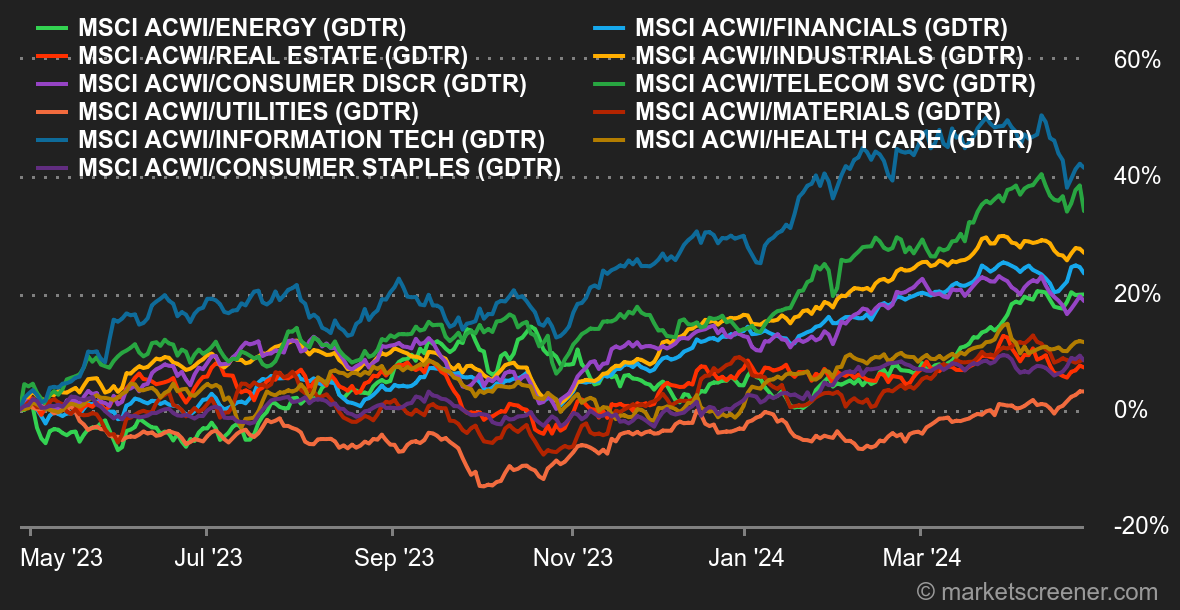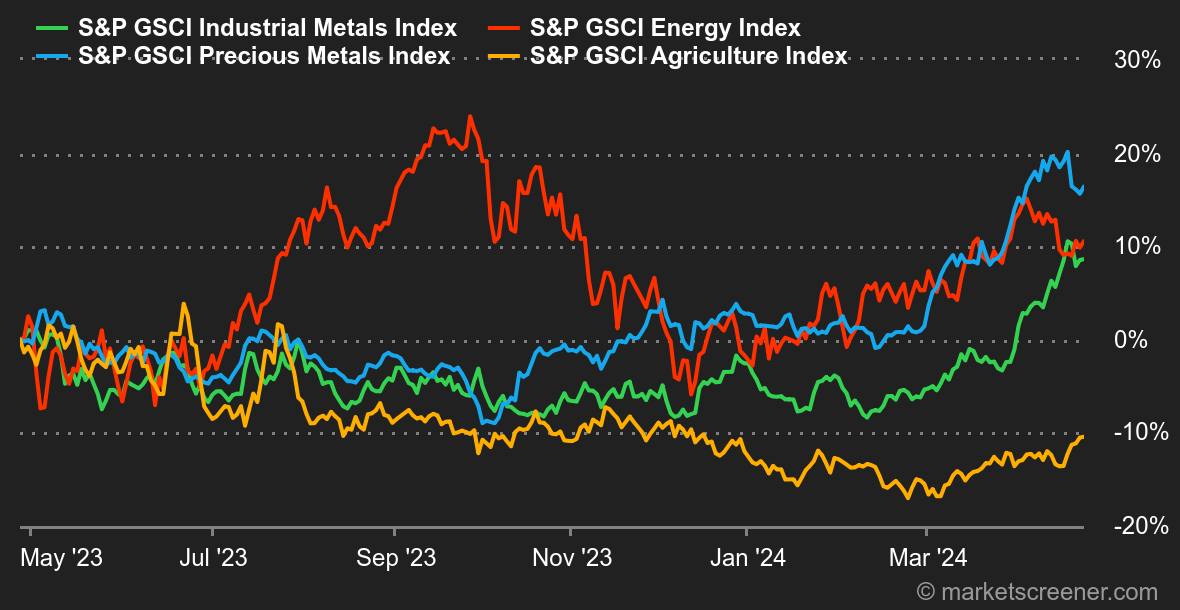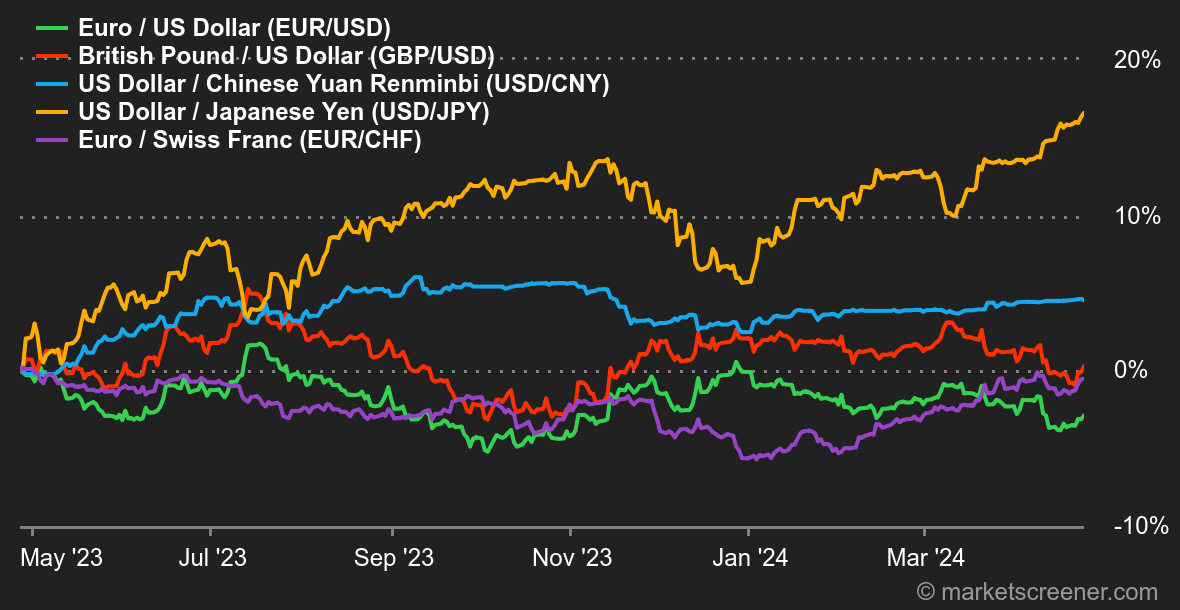Gainers:
- Darktrace (+28%): The British cybersecurity company has accepted a $5.32 billion takeover offer from US private equity firm Thoma Bravo, representing a 44% premium to the average share price over the last three months.
- Anglo American (+24%): The London-listed mining group this week received a $38.8 billion takeover offer from Australian giant BHP, which wanted to form the world's leading copper producer. The British group found the offer undervalued and unattractive to its shareholders, and ultimately rejected it.
- Vertiv (+20%): The US supplier of data center equipment is riding the AI fervor. It unveiled solid quarterly results that exceeded expectations, with sales up 8% and orders up 60%, driven by significant growth in all regions. As a result, the Group announced the launch of a share buyback program and raised its half-year and full-year forecasts.
- Nordic Semiconductor (+30%), ASM International (+18%), Infineon Technologies (+9%), STMicroelectronics (+7%): Drawn into negative territory last week by the poor performance of Taiwan's TSMC, European semiconductor players are taking their revenge. They were boosted by above-consensus results from Texas Instruments and one of them, ASM International. Norwegian company Nordic Semiconductor reported quarterly revenues down by half, but in line with forecasts.
- Hasbro (+18%): The gaming giant reported quarterly sales down (-24%), mainly due to the disposal of its eOne audiovisual content subsidiary and a decline in the consumer products segment, but ahead of expectations. The Group's cost-cutting program paid off, with a marked improvement in profitability and an operating margin of almost 20%. Buoyed by the performance of its other sales segments, the group confirmed its full-year forecasts.
- Tesla (+16%): Tesla is not doing any better, with sales in freefall (down 9% in the first quarter) and problems piling up (malfunctions and vehicle recalls). But the automaker delighted the markets by promising to launch low-cost vehicles in 2025 to reverse the trend, by working on the efficiency of its production lines. That was all it took to put an end to the share's downward trend.
- First Citizens Bancshares (+15%): The US bank, which absorbed regional lender Silicon Valley Bank (SVB) after its collapse in early 2023, is reaping the benefits of this integration. It posted a better-than-expected quarterly profit, more than doubled its interest income and announced a reduction in net expenses.
- BeiGene (+15%): Good news for the US-listed Chinese oncology biotech. The European Commission has approved its drug tislelizumab as a treatment for non-small cell lung cancer in three indications. The Group also confirmed the efficacy of its Brukinsa treatment, presenting new data at a medical event this week.
- Carrier Global Corporation (+12%): The heating, ventilation and air-conditioning specialist is doing well. Over the past quarter, sales gained 17%, adjusted operating profit 44% and EPS 19%. The market did not punish the slight downward revision of the group's annual sales forecasts ($26 billion versus $26.5 previously), which anticipate a reduction in demand against a backdrop of inflation.
Losers:
- Hertz (-22%): The car rental company continues to pay for the failure of its electric vehicle strategy. It reported timid sales growth for the quarter (+2%) and a larger-than-expected loss, exacerbated by higher fleet repair costs. It announced its intention to sell a further 10,000 electric vehicles, for a total of 300,000 this year. The stock has dropped 55% since January 1, and hit an all-time low this week.
- JetBlue (-20%): Bad news all around for the US airline. It reported a higher net loss and a 5.1% drop in operating revenues for the past quarter, and anticipates a decline in sales for the next quarter (between 6.5% and 10.5%) and for the full year. The Group is suffering from overcapacity in Latin America, and is therefore planning to cut routes in Colombia and Peru.
- Old Dominion Freight line (-10.7%): Founded in 1934, Old Dominion Freight Line began as a modest family business and has grown to become one of the largest less-than-truckload (LTL) freight carriers in North America. The company reported revenue of $1.46 billion, which was below the analyst estimate for revenue of $1.47 billion.
- Bristol-Myers Squibb (-9%): The pharmaceutical giant reported quarterly sales up 5%, ahead of expectations, but was unable to offset expenses linked to the acquisitions of Karuna Therapeutics, RayzeBio and Mirati Therapeutics, which resulted in a marked increase in marketing, sales and administration expenses. The Group has also significantly lowered its annual guidance for adjusted earnings per share, anticipating patent losses.
- Meta Platform (-8.5%): The tech giant dropped after its earnings report spooked investors. Despite beating earnings and revenue estimates, Meta Platforms raised its total spending guidance for 2024, causing its shares to fall by more than 15% in pre-market trading. Investors are wondering if the company's embarking on a costly, mismanaged AI program, similar to what happened with the Metaverse.
|

 By
By 


























